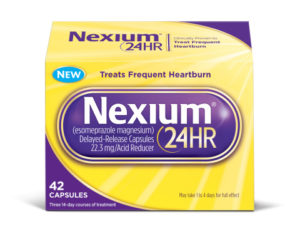 Popular over-the-counter heartburn drug Nexium, has made news recently over possible harmful side-effects. Multiple lab tests have revealed that the drug can lead to damage of arteries as well as an increased risk of heart attack or heart disease.
Popular over-the-counter heartburn drug Nexium, has made news recently over possible harmful side-effects. Multiple lab tests have revealed that the drug can lead to damage of arteries as well as an increased risk of heart attack or heart disease.
According to a CBS news report, AstraZeneca, the maker of Nexium, responded with a statement noting that the study was conducted in a laboratory setting, “not in humans within a controlled clinical trial. Therefore, conclusions around cause and effect cannot be made.
In a CNN report it was stated that patients who took PPIs (like Nexium) had a 96% increased risk of developing kidney failure and a 28% increased risk of chronic kidney disease compared to the patients who took the histamine H2 receptor blockers (another form of heartburn medication.)
AstraZeneca also stated that the drug is typically safe to use when taken in the prescribed doses, however many people do not follow the recommended doses as printed on the label. Roughly 1 in every 14 Americans use some form of heartburn medication, and many people end up overusing the drugs over a long period of time.
This continues to be a somewhat confusing topic due to the fact that it has not been proven that Nexium is the cause of the damaged arteries, but with all of the speculation there is cause for concern. The FDA has called for increased testing on all heartburn medications to ensure the products are safe, and the side-effects are properly labeled on the packaging.
There have not been any lawsuits filed over this issue, but if it is revealed that Nexium is linked to heart problems, there could be cases to come.
